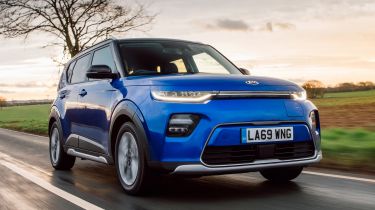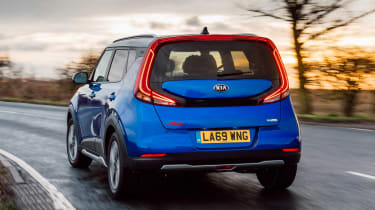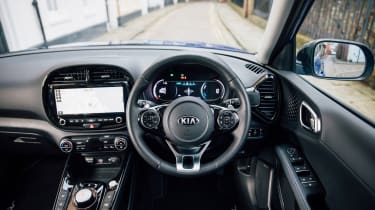New Kia Soul EV 2020 review
The all-electric Kia Soul EV combines quirky design with enormous capability

Verdict
The Kia Soul EV is a compelling electric car, offering great performance, refinement, comfort and tech. And once you’ve got past the purchase price, the low running costs will mean it makes better financial sense the further you drive. No, the exterior styling won’t be for everyone, but better to be bold than boring.
The first Kia Soul EV appeared back in 2014, following in the tyre tracks of petrol and diesel siblings when it wasn’t clear if electric cars would ever take off. How times change, because the new Soul EV is now the only variant that is offered in Europe, and this is our first chance to drive it in the UK.
Underneath, this latest model uses the same powertrain as the popular Kia e-Niro. That means a single electric motor sends 201bhp and 395Nm of torque to the front wheels, fed by a 64kWh lithium-ion battery mounted under the floor. Kia claims a 0-60mph sprint takes 7.6 seconds, and on paper the Soul EV will return 280 miles of range from a single charge.
• Best electric cars on sale now
On the road, those performance figures means it feels lively. Some electric cars lack punch beyond 30mph, but not here. Even on the motorway, a jab of the accelerator will get you into gaps in traffic with ease. When it comes to slowing down, the regenerative brakes – which convert momentum into electrical energy, boosting range – will do most of the work. The rate of deceleration is adjusted using paddles behind the steering wheel, and you’ll soon become accustomed to driving almost entirely without the brake pedal.
Used - available now

2022 BMW
3 Series Touring
59,339 milesAutomaticDiesel2.0L
Cash £22,950
2022 Nissan
Micra
12,236 milesManualPetrol1.0L
Cash £12,200
2021 Volkswagen
Tiguan AllSpace
17,423 milesAutomaticDiesel2.0L
Cash £23,700
2020 MG
ZS EV
18,568 milesAutomaticElectric
Cash £11,300There are four driving modes: Normal, Sport, Eco and Eco+. We cycled through all of them on our test route, and without making any great effort to be efficient we averaged 3.5mi/kWh. This is a decent return in cold weather, and suggests the Soul EV will get close to its official range in warmer conditions.
In corners, the steering is light and there’s a reasonable amount of body roll, but the car has to be pushed hard to lose composure. The ride isn’t too firm either - only the harshest potholes will cause any discomfort in the cabin. Meanwhile, the sound of the motor barely registers above the road and wind noise, both of which are suppressed well too.
Inside, there’s a seven-inch digital display behind the steering wheel and a 10.25-inch colour touchscreen with sat nav. It’s one of the better systems out there with a crisp resolution and responsive interface, and it’s also compatible with Apple CarPlay and Android Auto. The switchgear is easy to navigate, although the interior design is the only element that really lets the side down. Some of the plastics feel a little low-grade alongside the leather trim, and the lack of colour makes it less exciting than the outside looks suggest it should.
To keep things simple, Kia has opted for a single, highly-equipped trim level in the UK. Take a deep breath, because it gets LED lights, rear privacy glass, electric and heated wing mirrors, rain-sensing wipers, leather upholstery, heated front seats and steering wheel, an electrically adjustable driver’s seat, adaptive smart cruise control, an auto-dimming rear-view mirror, a head-up display, DAB radio, a reversing camera and rear parking sensors, wireless phone charging and a 10-speaker Harman Kardon sound system as standard. Also included are a suite of active driver safety aids such as blind spot detection and forward collision avoidance.
Plugging into a 100kW DC charger will see the Soul EV’s battery replenished from 0-80 per cent full in 54 minutes via the CCS port located under the car’s nose. Using a Type 2 cable, a 7.2kW home wallbox charger (which Kia can install for you for less than £300, thanks to its partnership with Pod Point) will complete a full top-up in nine hours and 35 minutes. On a typical electricity tariff, that should cost you less than £9.
Boot space stands at 315 litres with the rear seats up and 1,339 litres with them down. This is less than the e-Niro, but you do at least have the option of lowering the boot floor to free up a bit more room. Passenger space is improved too: there’s plenty of leg and headroom for tall adults throughout, although the middle seat of the rear bench is more suited to children.
Put down a deposit of £5,000 on the Soul EV, and you’ll still be looking at monthly repayments of more than £500 over a three-year term. That’s pretty steep, especially if you’re looking at electric vehicles as a way of cutting fuel costs. But if you’ve got the cash and you’re prepared to see out most of Kia’s seven-year, 100,000-mile warranty, the Soul EV is a top choice.










